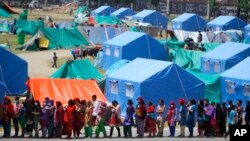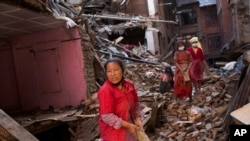Four more people have been rescued from rubble days after the devastating earthquake in Nepal, including a 101-year-old man.
Police said Sunday the man was found about 80 kilometers northwest of the Nepalese capital of Kathmandu.
Rescue workers earlier reported three other survivors had been pulled from the debris in the Sindhupalchowk district northeast of Kathmandu.
But officials said, eight days after the massive earthquake, hopes of finding more survivors are fast fading and the death toll could climb "much higher" than the current total of more than 7,275.
Thousands of people are still missing, including about 1,000 visiting Europeans.
US military
Also Sunday, U.S. military aircraft, heavy equipment and air traffic controllers arrived in Nepal. The U.S. military would help manage the growing piles of relief supplies clogging Nepal’s only international airport in Kathmandu, which is struggling to distribute the aid arriving from around the world since last Saturday’s 7.8-magnitude quake.
“U.S. military is going to come in over the next few days providing unique capabilities for immediate life-saving aid so we are going to come in, we are still going to try to save people's lives that are out in the remote villages," Brigadier General Paul Kennedy said.
Aid has been slow to reach some of those most in need.
"There are still villages where we know that all houses have been destroyed but have not yet been able to reach," said Nepalese Finance Minister Ram Sharan Mahat. "The aftershocks have not receded and we expect the final casualty numbers to climb much higher."
"Nobody has come here," said earthquake victim Laksmi Shrestha, who lives in the village of Pauwathok, 50 kilometers east of Kathmandu. "Nobody has helped us. We are all doing it ourselves. We are eating whatever little we have."
Another villager, Indra Bahadur Bharati, said, "Unless somebody comes with some relief or some help, we will die of hunger. What can we say, what can we say now."
Aid volunteer Abhishek Bhutoria said rescue workers often lack information on the towns most in need.
"The challenge is basically choosing the place where people have not been reached, we need to get the data, for instance this place, we don't want to reach some place where people have already reached," Bhutoria said. "We want to choose places where other people have not reached."
Aid efforts
In Kathmandu, some signs of normalcy have returned as merchants conducted business and some residents packed up tents and moved indoors. But the overwhelming smell of dead bodies has become a main reason many residents have not returned to their homes.
U.N. humanitarian affairs chief Valerie Amos visited devastated areas in Nepal Friday as part of her three-day visit to assess relief operations. She told reporters that emergency funding for relief efforts was streaming into the country and urged the international community to increase its support.
Nepal's government is giving $1,000 to the families of the dead plus $400 for burial costs.
The United Nations said more than 8 million people had been affected by the earthquake and at least 2 million had been displaced.
The International Committee of the Red Cross has created a website for friends and family to report missing loved ones or search for those who have checked in.
VOA's Smita P. Nordwall contributed to this report from Washington. Some material for this report came from Reuters.






